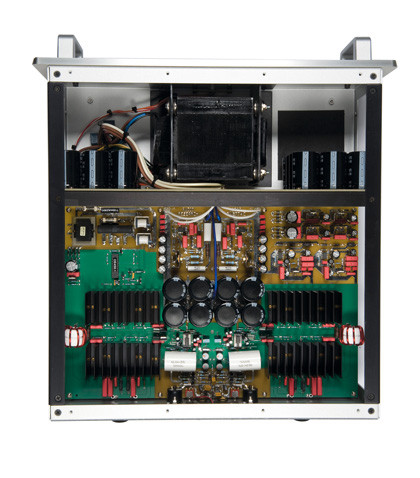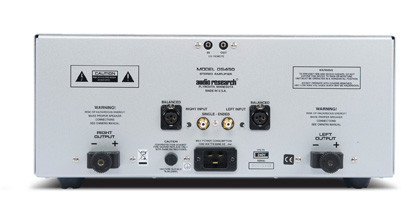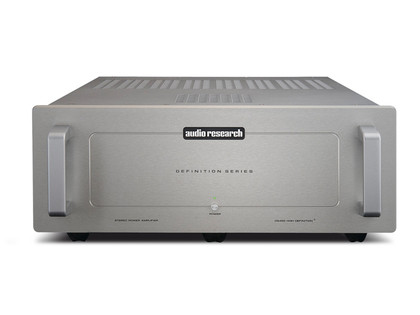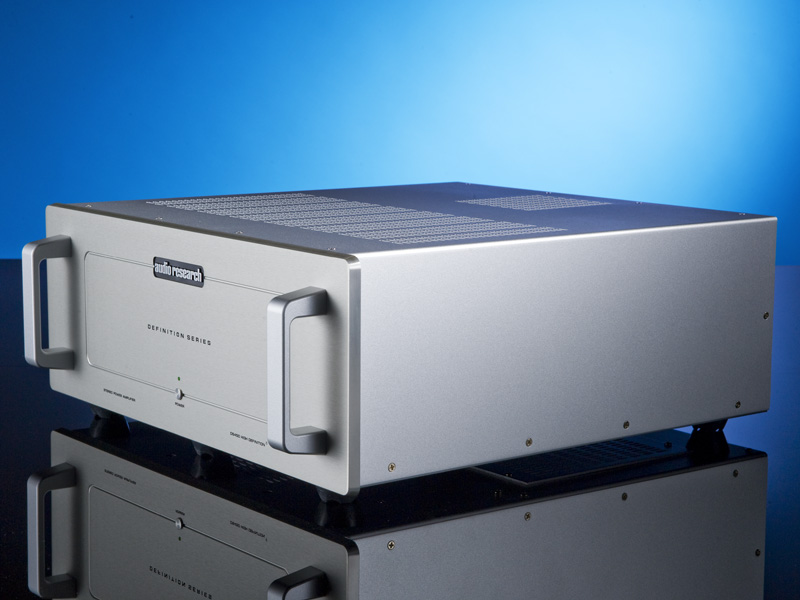TechRadar Verdict
Pros
- +
Very neutral transparent sound
- +
lots of power and low running temperature
Cons
- -
No serious grumbles or complaints
Why you can trust TechRadar
Given its penchant for producing large, heavy, behemoths, Audio Research's launching of a Class D power amp, the new DS450, is more than slightly surprising.
While Pure Class A still sets a benchmark when the highest quality results take precedence, there are many practical drawbacks – excessive heat, large size, high price, massive power consumption – need one go on?
The DS450, on the other hand, features an analogue-based Class D pulse-width modulated switching output stage. High output power, low-running temperature, low power consumption and excellent sound quality are promised. But can such clever technology really challenge Class A's sonic supremacy?
Up the stakes
Like most power amps, the DS450 is fairly simple. You've a choice of unbalanced/balanced inputs – via RCA/XLR sockets – and a single set of loudspeaker output terminals using Cardas binding posts. Add a mains on/off switch, plus sockets for remote on/off and that's about it.
Audio Research first used pulsewidth modulation technology in its DSi200 integrated. But the DS450, ups the stakes, employing twice as many 500-watt MOSFET power devices on each side. As a result, the DS450 delivers around 450W per channel into eight ohms.

A conventional Class A/B amplifier offering this sort of output would run fairly warm. But the Class D DS450, being around 93 per cent efficient, produces hardly any heat. So, you could hide the amplifier away in a cupboard without having to worry about ventilation.
Sign up for breaking news, reviews, opinion, top tech deals, and more.
Audio Research's website mentions this and even suggests users might want to leave the amp permanently switched-on for best sound quality. However, the DS450 sounds good from 'cold' and is pretty close to optimum after about 25-30 minutes, so there's not much need. Idle, the DS450 only consumes 55 watts.
Many previous ARC power amps have been massively big and heavy, producing huge quantities of heat, while drawing sizeable amounts of current from the mains supply. Indeed, the company's reputation was built on no-compromise designs that sacrificed everything for sound quality. So the eco-friendly DS450 is a totally new departure.
It's not just that it's solid-state, rather than tube; Class D pulse-width modulation technology is the real talking point. Given the reputation of ARC's Class A tube designs, the DS450 has a lot to live up to. While no one's claiming Class D amplifiers are sonically superior to their pure Class A counterparts, the practical and environmental advantages of the former are not to be under-valued. So, listen without prejudice – the DS450 sounds extremely good.
The best sound is produced via the balanced inputs. To utilise these you'll need a preamp with balanced outputs. Audio Research's LS26 offers this option. With balanced you can look forward to a more spacious sound, with increased dynamics. So, investing in a set of XLR balanced cables is mandatory.

Physically, the DS450 is almost totally silent – no transformer buzz, and (obviously) no noise from cooling fans. The amp is quiet electrically, so those with ultra-efficient speakers should hear no residual hiss or hum – even with an ear to the drive units!
Traditional image
In terms of styling, the DS450 is traditional Audio Research, complete with signature grab handles on the front. While the DS450 is not massively heavy, it is fairly big and ungainly, so the handles are useful. The amp is quite solidly made, but we're not talking heavy 'battleship build' here.
The casework is made from brushed aluminium, with a front panel just under one millimetre thick. Being non-magnetic, aluminium should deliver a sweeter, more open sound compared to a steel case, due to reduced eddy current effects.
Meanwhile, the lightweight chassis should also reduce the adverse effects of air and structure-borne vibration. Finish is extremely good and the sculpted Audio Research logo looks cool and classy.
The internal layout is extremely neat and the Cardas speaker binding posts are easy to use and give clean and tight connections. ARC has given the amp a generous power supply with a large power transformer and something like 1239 Joules of energy storage – twice that of the DSi200!
Hence the DS450 weighs in around 25kg (55lbs)and is somewhat front-heavy, because the power transformer is forwardly placed.
Manufactured, built, and tested in ARC's Plymouth Minnesota factory – the DS450 is not assembled from parts fabricated elsewhere, or built in the Far East. Many components are custom-made and/or designed in-house, including power transformers, filter chokes and the Litz wiring used internally.
Lucid sound
The DS450 replaced a Musical Fidelity kW-750 power amp driving Impulse H1 loudspeakers. Our preamp was a Musical Fidelity Primo (pure Class A tube) with a Musical Fidelity AMS tube CD player. The kW-750 is a powerful (750 watts) Class A/B bridged design with unbalanced inputs.
The power amp delivers a clear, clean, open sound with tight, firm bass and crisp definition. Used with unbalanced cables (the MF does not offer balanced) the DS450 initially sounds very slightly 'smaller' in scale, compared to the kW-750, even after volume levels are increased.

However, after replacing the MF Primo with an Audio Research LS26 preamp (£5,499) and using balanced interconnect cables, the DS450 sounds bigger and easily matches the big MF for scale and dynamics. Sonically, the LS26 and DS450 seem to go very well together – a very symbiotic partnership.
Although the LS26 is a hybrid tube/transistor design, it has a classic tube sound – open, rich, full, and very holographic, with excellent detail and dynamics. Paradoxically, the all-tube Primo produces a sharper more lucid sound – crisp, tactile and open – and to its credit the DS450 mirrors this accurately.
Partnered by the LS26, the DS450 sounds fuller, smoother, and surprisingly tube-like. The balanced interconnects definitely create a bigger/deeper soundstage, enhancing size, scale and dynamics – qualities one associates with Audio Research components. Bass has impressive power and weight.
While the DS450 isn't a replacement for ARC's classic tube amplifiers, it is without question an impressive-sounding, highly capable amplifier in its own right – powerful, solid and clean, yet fast, energetic, delicate and subtly detailed too.
Ear-pleasing
By any standard, the DS450 sounds very clean and neutral, with tremendous dynamics and ample power. Partnered with an LS26, the DS450 delivers real Audio Research performance in a package that's practical and relatively affordable.
While some Class A/tube diehards may not take the DS450 seriously, because of its Class D output stage, those with an open mind will find much that pleases the ear.
If you always fancied Audio Research, but were put off by things like size, weight, heat, and price, the DS450 is the answer to a prayer.
Follow TechRadar Reviews on Twitter: http://twitter.com/techradarreview
